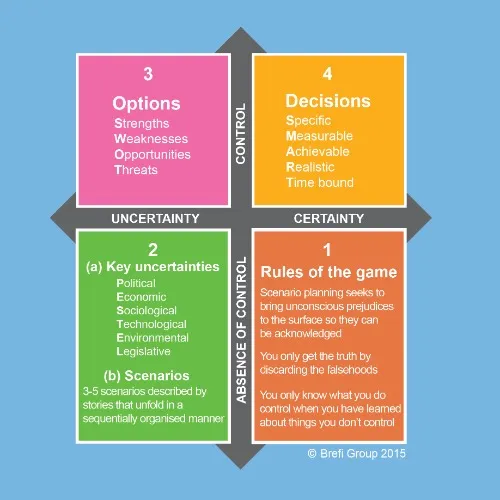Scenario Planning for Coaches
Scenario planning for coaches - a simple and powerful process
Introduction
Scenario planning provides an alternative model for coaching – providing a powerful process for exploring reality before developing options and making a decision. Although developed as a tool for organisations looking forward maybe ten years, Brefi Group has adapted a South African system so that it can be used in coaching. The advantage of this simple model is that it can be done in just a few minutes as a useful discipline before making a decision – as well as more intensively during a workshop programme over several months.
Scenario planning is a structured process for exploring the future. It is about what might happen, could happen. It is a study of how possible influences on a system might evolve and what could be the impact of unexpected developments.
The purpose of thinking about the future is not to predict it, but to discover alternative outcomes and prepare for them. The future is complex; it involves outcomes that are not intended and may be unexpected, as well as those we plan for. However, many of the influences that will determine the future are already evident.
Human beings and organisations do not act in response to reality but to an internally constructed version of reality; their personal map of the world. In order to gain new insight from scenarios, one has to identify which information is of strategic importance and then transform it into material which penetrates the consciousness of the client. This is best done through descriptive stories.
By presenting other ways of seeing the world, scenarios give managers different perceptions of reality, leading to strategic insight beyond their normal experience, even though it might not be new information but something that is already known and is right in front of the nose of the observers.
Because scenarios are stories that unfold in a sequentially organised manner, they can be viewed as multiple pathways into the future. Each path denotes a hypothetical condition of the environment to which an option for action can be attached: “If the future turns out this way, I will do that.” By understanding the trends that will drive the future it is possible not only to be better prepared for developments, but to influence the system in order to achieve a better outcome.
Scenario planning model
The system we use is based on one developed in South Africa and described in “The Mind of a Fox”. It uses a simple matrix with two axes: the horizontal one portrays certainty and uncertainty and the vertical one control and the absence of control. These two axes yield four quadrants: the bottom right-hand one represents things that are certain but outside our control. Then going clockwise, the bottom left-hand one encompasses things that are both uncertain and outside our control; the top left-hand one things which are uncertain but within our control; and the top right-hand one things which are certain and within our control.
The matrix is shown below, with useful additional coaching activities listed within the quadrants: -

The first stage is to identify the ‘rules of the game’. These are things that are certain and over which we have no control and could include such rules as ‘people prefer the status quo’ or ‘different individuals are motivated in different ways’, or ‘fuel/share prices fluctuate’. This stage of scenario planning seeks to bring unconscious prejudices to the surface so that they can be acknowledged.
Learning about things that you don’t control helps to identify what you do control.
Next, we consider those things that are uncertain as well as outside our control. Key uncertainties are factors which we have positively identified, but we don’t know which way they are going to go. The object is to identify those factors that are likely to be most relevant to a particular situation and have the highest impact potential, whether as an opportunity or threat. They drive the design of possible scenarios. However, there are also other factors that we are only dimly aware of, which we call ‘wild cards’.
From this information we can develop three to five scenarios of the future.
These should not represent ‘high’, ‘medium’ and ‘low’, but, rather, different mixes of parameters to give richness to the learning. The scenarios are then brought to life as descriptive stories which help to organise things in our mind and relate events causally, with one thing leading to another.
Scenarios make sense of the future in the same way as historical accounts make sense of the past. Each scenario must have a simple, vivid theme that is logically consistent in itself, but differs materially from the other scenarios on the set. It must have a compelling title that conjures up the image of the scenario without the need for the text to be read. While constrained by the rules of the game and driven by key uncertainties, it should evoke the same feelings as a really good novel and open up areas of thinking.
We can then develop and evaluate options representing the best response to each scenario. Ideally these should have decision points at which they can be reviewed as we become aware of how the future is actually developing. Once we have decided what led to the occurrence of an event it has become more predictable and therefore manageable and we are able to say “If the future turns out this way, I will do that”.
Conclusion
Scenario planning affects and broadens perception, thereby providing the requisite variety in mental models necessary to see and perceive the outside world beyond traditional business models.
Although scenario planning in organisations would traditionally consider a time horizon of 5-7 years, in a coaching context the time span might be only a few days or a few months. Nonetheless, the process enables the client to explore in depth the possibilities and consequences of different outcomes before constructing options and making a decision.
Brefi Group Limited
Unit 11 BSC, Hood Road
Barry CF62 5QN
United Kingdom
Reg. No. 1669333
Copyright 2024 Brefi Group Limited. All Rights Reserved
